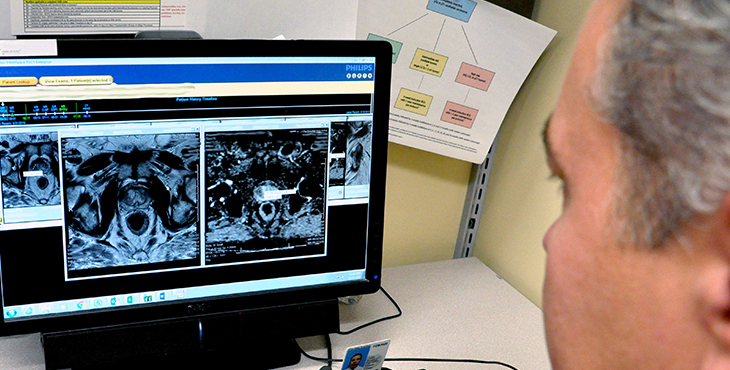MRI scans play an important role in prostate cancer care. (Photo by Brian Hayes/VA)
A longer version of this interview originally appeared in VA Research Quarterly Update (VARQU).
Dr. Ted Skolarus is a urologic oncologist—a physician who treats cancer of the urinary tract and male reproductive system. He serves as section chief of urology at the VA Ann Arbor Health Care System in Michigan, and is an associate professor of urology at the University of Michigan. He is also a research scientist at the VA Health Services Research & Development Center for Clinical Management Research in Ann Arbor.
His research is focused on survivorship care for men who have undergone treatment for prostate cancer. While survivors need to be monitored by their providers for cancer recurrence, there are also a number of quality-of-life issues, like urinary incontinence and sexual health, that should be assessed by the medical team. In many cases, there are things that can be done to help survivors enjoy a better quality of life.
VARQU spoke with Skolarus about his VA Career Development Award to help improve the quality of survivorship care for Veterans who have been treated for prostate cancer.
How prevalent is prostate cancer in the U.S.?
The classic incidence is about 1 in 6 men will be diagnosed with prostate cancer at some point in their lifetime. Given that the VA health care system is over 80 percent male, there is a substantial number of Veterans who are diagnosed with prostate cancer. The annual incidence of prostate cancer impacts approximately 12,000 Veterans in the VA each year.
There have been changes in the screening recommendations from various organizations, as to the value and effectiveness of early detection of prostate cancer through prostate-specific antigen [PSA] screening. But in general, most approaches rely on shared decision making—between providers and patients—regarding whether men wish to be screened for prostate cancer.
There are some high-risk groups—including men who were exposed to Agent Orange, African American men, men with a strong family history of prostate cancer, or early onset prostate cancer in a relative—that may be at greater risk of aggressive prostate cancer, that should more strongly consider screening.
What is the survival rate for prostate cancer?
The five-year survival rate for localized prostate cancer is nearly 100 percent. On the other hand, prostate cancer is one of the leading causes of male cancer-related deaths—there are nearly 30,000 deaths expected in 2018. There are over 3 million men alive with a diagnosis of prostate cancer in the United States. Given the patient population and access to health care and screening in the VHA, thousands of these prostate cancer survivors are cared for in the system.
What types of follow-up care are important for prostate cancer survivors?
We recommend—as part of the American Cancer Society prostate cancer survivorship guidelines—measuring and addressing men’s quality of life, with respect to urinary, sexual, bowel, and overall health. That is important to do given the side effects of treatment, yet there remains a lack of systematic organizational approaches for assessment. Following PSA as a cancer surveillance approach is also important.
I think engaging and using clear communication about survivorship care plans with primary care providers who end up caring for prostate cancer survivors can really make a difference. Good communication is especially helpful in getting men back to their specialists if there is concern for a recurrence of their prostate cancer or unmet needs with respect to side effects.
Can you explain what your VA Career Development Award involved?
The first aspect of the award was to look at things that would be consistent with high-quality prostate cancer survivorship care. There’s a paucity of quality measures, so that was, in some respect, the reason for this work—to define what quality prostate cancer survivorship care might look like.
As we looked at a couple different markers of survivorship care quality, we found a lot of variation within the VA health care system. One of the first things that we did was look at men who were getting androgen deprivation therapy [ADT], and if they were getting a recommended bone density testing to screen for baseline osteoporosis. We know that this is recommended for most men who will be starting hormone therapy.
We found that up to 1 in 5 men were getting this screening study. This was fairly consistent with findings from Medicare studies. But we also found that the more likely you were to get a bone density test, the more likely you were to be diagnosed with osteoporosis. And, if you were diagnosed with osteoporosis, you were more likely to get vitamin D, calcium, and treatment for osteoporosis, in an attempt to prevent fracture given increased risks with ADT. So, this part of the study pointed out areas for improvement in bone health for men who were getting hormone therapy.
You also developed an intervention for prostate cancer survivors that used automated telephone calls with advice on symptom management. Can you explain?
As part of the Career Development Award, I was able to have multiple survivorship-related projects dovetail with each other. One of those was a randomized trial of over 500 men with prostate cancer across four sites in the VA: St. Louis, Cleveland, Ann Arbor, and Pittsburgh. We wanted to understand if we could use an automated telephone system to not only assess men’s side effects, but also to give tailored newsletters and feedback on how they can help themselves self-manage those side effects. We also wanted to teach men when to reach out to their doctors to help them with side effects that might be overlooked during routine care.
That work was presented at the American Society of Clinical Oncology’s annual meeting, and highlighted during one of its poster discussion sessions, this year.
What we found was while there were small effects on men’s overall quality of life, when they did want to focus on a given area like urinary or sexual health, we saw improvements in that area. That demonstrates the potential impact of not only measuring patient-reported outcomes for prostate cancer across the entire VA system, but also giving Veteran prostate cancer survivors tailored self-management strategies to improve those areas that are affecting their health. This degree of support is not available in any other system. We are excited about its potential for national impact, as Veteran engagement was excellent throughout the study.
Click here to read the full interview with Dr. Skolarus and learn more about caring for prostate cancer survivors.
Topics in this story
More Stories
Diverse representation of women in health care research allows MVP to make discoveries for women’s health
Join the Million Veteran Program online. You will have the option to receive an at-home blood sample collection kit in the mail.
VHA's new podcast series, New Horizons in Health, features a candid discussion of psychedelic assisted therapies for Veterans experiencing mental health conditions.






